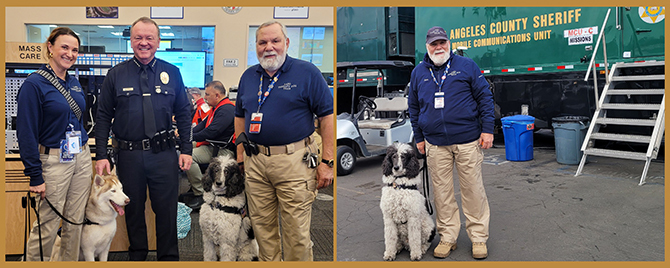Care and Comfort: Keeping Seniors Safe and Secure Throughout Historic Los Angeles Wildfires


Care and Comfort:
Keeping the Seniors of LAJ Health Safe and Secure Throughout Historic Los Angeles Wildfires

As 2025 began and families returned from holiday celebrations, no one could have imagined the devastation, anguish, and heartache the people of Los Angeles and the surrounding areas were about to experience.
Fortunately, Los Angeles Jewish Health (LAJH) remained out of harm’s way. At LAJH, the safety and security of those in our care is paramount. We prepare each year for any disaster or crisis that could affect our campuses. Efforts include online courses and real-time, in-person drills.
On January 7, as media shared images of the Pasadena Jewish Temple Center being directly impacted, it became clear this rapidly growing disaster would affect our community, including through a potential surge of seniors dislocated from other sites with nowhere else to go. That night, Senior Vice President of In-Residence Services Ilana Springer, CEO and President of LAJH Dale Surowitz, and a handful of leaders quickly jumped on the first of many daily calls, reviewing all emergency plans to ensure the safety of our residents, participants, and staff.

Among their first actions was confirming we had a good inventory of emergency supplies, including non-perishable food and water, surgical masks, and generators. Facility staff also positioned additional air filtration systems and confirmed emergency lighting was operational. Perhaps most important was assessing the welfare of our staff. Many LAJH staff live within the impacted area, and we wanted to make sure they were safe. Next, we needed to confirm we would have adequate staffing to continue providing our excellent care without disruption. The cross-functional teamwork from across LAJH that stepped up to ensure coverage was impressive: We made sure staff were standing by for deployment wherever help was needed.
We communicated quickly and clearly to our internal and external audiences, updating them on our emergency efforts via email, voicemail, social media, and the website. We also reached out to fellow senior care centers and community leaders offering our support.
Those displaced who came to us for shelter included a couple evacuated from their apartment in Palos Verdes, another woman from Palos Verdes whose home burned down, and a woman evacuated from her home in Encino.
Our volunteers and even our cherished residents played a part in providing comfort. The wonderful canine companions and handlers who visit our campuses, thanks to funding from the Steven Ohren Foundation, reported to emergency command centers. They provided mental health support to those impacted by the disaster, including emergency workers as well as victims.
In addition, our seniors teamed up with local schoolchildren to create thank-you signs for the heroic firefighters who worked around the clock under extreme and dangerous circumstances.
While our campuses fortunately remained unthreatened throughout, the air quality prevented outdoor activities. One afternoon during this period, Chief Mission Officer Rabbi Karen Bender was finishing a lesson on the fourth floor of the Joyce Eisenberg-Keefer Medical Center when she noticed that, one-by-one; participants were turning to look out the window. They were seeing smoke from the Kenneth fire that had started that afternoon. The flames were miles away, but it was clear from the residents’ faces that this development was creating growing concern and fear. As Rabbi Bender and Ilana began strategizing about the best way to address the issue, Andrew, an activity aide at JEK, decided—without prompting—the best thing he could do to help was simply to sit down at the piano and start playing. This immediately diverted the seniors’ attention, and suddenly, everyone looked comforted and cared for. It was a signature LAJH moment, highlighting the warmth, dedication, and collaboration of our team and of the entire LAJH family.
From ensuring we had evacuation plans and transfer agreements (including agreements with other facilities) in place, to continuously monitoring our emergency supplies, we remained vigilant throughout this disaster and confirmed that LAJH was indeed well prepared. The LAJH family can rest easy knowing we are ready for whatever may come our way.
Of course, you can never be too prepared, and before a disaster is the best time to stock up on blankets, wheelchairs, non-perishable food, air purifiers, bottled water, etc. If you would like to contribute to help us purchase additional emergency supplies for the safety of the seniors in our care and for our devoted staff, please click here.

